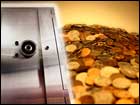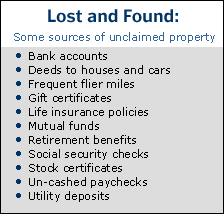
NEW YORK (CNN/Money) -
Most of us know the satisfaction that comes with discovering a pile of change under the couch cushion or putting on a coat and finding a few dollar bills crumpled up in the pocket.
Imagine how good it must feel to learn you have a couple hundred dollars sitting in an old bank account or shares in company stock that have been splitting and appreciating for the past few decades.
It's entirely possible that you or a family member has unclaimed property out there. At last count, 42 states reported nearly 66 million records of long-forgotten goods worth about $15.6 billion.
The check was in the mail...20 years ago
According to Warren Foss, president of the National Association of Unclaimed Property Administrators, the most prominent unclaimed property is money from bank accounts, life insurance policies and mutual funds. But states also hold onto such things as gift certificates, paychecks, tax refunds, utility deposits and even tangible items like jewelry and art until the owners or their next of kin step up to state their claim.
It seems odd that so many people would lose track of their property, but it's really not that uncommon. People pass away without wills or information about relatives. Employees quit without realizing they have another paycheck coming to them. Parents take out annuities for their children and never tell them about it. Social Security checks get lost in the mail. "Often people move and don't leave a forwarding address or don't open mail from companies trying to contact them," added Foss.
Click here to use CNN/Money's asset allocation calculator
The law surrounding unclaimed property varies from state to state, but most companies (they're known as "holders" in unclaimed property circles) are required to report unclaimed property on an annual basis and turn the property over to the state if it's not claimed after three to six years.
Once this property is in the hands of the state, it's held indefinitely. Although states run ads in papers or set up booths at state fairs and shopping centers to try to notify the public, they rarely have the resources to contact every person in their records. If you want the money to which you're entitled, you need to go looking for it.
Beware of the middleman
Many people are unaware that unclaimed property exists in their name until they are solicited by a so-called heir finder or asset recovery firm. Heir finders typically dig through state records or go directly to companies looking for big-ticket items. They then try to locate the owner or the owner's next of kin and, for a percentage of the asset, offer to reunite the two.

Other asset recovery firms send out mass mailings to people whose names match those in unclaimed property databases. The letters or post cards often don't specify the type of asset or amount. They simply ask you to pay a fee of anywhere from $10 to $30 in exchange for more information. This often turns out to be no more than a listing of different records that match your name and contact information for the unclaimed property departments in the states where you've lived -- information that is otherwise free and not that difficult to obtain on your own.
Sheila Adkins, public affairs manager for the Better Business Bureau, says that the state bureaus have received quite a few inquiries about asset recovery firms (11,000 last year) but not many complaints (75 last year). Still, she recommends that consumers proceed with caution when they are solicited by an heir finder. Always check with the Better Business Bureau and the unclaimed property office in the state where the firm is doing business to verify its legitimacy and find out what fees are reasonable for such a service. "Average fees are 10 to 25 percent of the value of the property," she said.
"I would urge people to avoid the firms that ask for a flat fee in return for a form letter with basic information," said Foss, noting that these companies aren't necessarily doing something illegal and can even be helpful in complicated situations. "I'd still always try to do the search on my own first."
Log on to sift for your lost treasure
If you want to see if there is any unclaimed property with your name on it, your best bet is to contact the unclaimed property departments in the states where you've lived or register with Missingmoney.com, which is the only such site endorsed by the National Association of Unclaimed Property Administrators and is completely free.
| |
 Related stories
Related stories
| |
| | |
| | |
|
Missingmoney.com has about $2 billion in unclaimed property in its database, which is linked directly to individual states. To register, you give your name and as much information as you want about old addresses or previous names. The site then matches your information with similar records in its database and gives you a snapshot view of all of the records that might be a match.
If any of the names or addresses look familiar, you print out a claim form, provide proof of your identification and send it out to the appropriate state. "The state will then verify whether the property is really yours," said Jeremy Katz, vice president of Missingmoney.com. "The process can take anywhere from a week to a year."
And be forewarned: the records may not be as detailed as you'd like. Many don't give the exact value of the property or any description. This, says Katz, is to discourage heir finders from using the site for their own benefit.
But just because it's vague doesn't mean a record isn't worth pursuing. According to Katz, the average claim is $250 but six-figure claims aren't unheard of.

|

